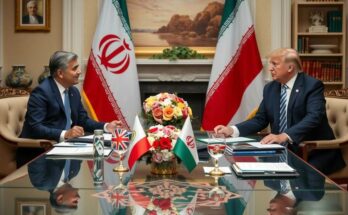Saudi Arabia remains neutral in the U.S. presidential race, valuing its relationships with both candidates. Political commentator Ali Shihabi emphasizes the Kingdom’s strategic importance, especially concerning the Israeli-Palestinian conflict. Shihabi notes a strengthening of Saudi ties with the Democrats since earlier tensions and highlights shifting Arab-American support for Trump. The potential for U.S.-Saudi normalization talks remains contingent on the next administration’s approach to Israel and Palestinian negotiations. The outcome of the election could be influenced by Arab-American voter engagement.
In recent discussions surrounding the forthcoming United States presidential election, Saudi political commentator Ali Shihabi expounded on Saudi Arabia’s neutral stance in the candidacy of either Republican Donald Trump or Democrat Kamala Harris. He emphasized that regardless of the outcome of the election, Saudi Arabia’s strategic relationships with both parties would continue to flourish. Shihabi articulated that the Kingdom’s primary objective is to use its alliance with the U.S. to tackle significant regional issues, notably the Israeli-Palestinian conflict. He noted, “The Kingdom is in a very advantageous position of having excellent ties with both parties.” Historically, Saudi Arabia has been perceived as leaning toward the Republican Party, yet its rapport with the Democrats has strengthened dramatically in recent years, especially following the onset of the Ukraine-Russia conflict which underscored Saudi Arabia’s importance in regional stability. The establishment of a new security pact between the U.S. and Saudi Arabia was previously anticipated; however, the recent escalation of violence following the Hamas attack on Israel has posed new challenges for this initiative. Shihabi underscored the critical nature of U.S. involvement in mediating the Israeli-Palestinian issue, suggesting that American influence is indispensable for realizing a sustainable peace. He remarked, “Without the U.S., efforts to push Israel toward a meaningful solution may struggle to gain traction.” Amidst these dynamics, Shihabi also acknowledged shifting trends among Arab-American voters, who now appear marginally more drawn to Trump than Harris, indicating a potential realignment based on perceptions of U.S. policy towards Israel. He posited that the Israeli-Palestinian conflict holds substantial emotional and political significance for Arab Americans, which may influence voter turnout in pivotal states such as Michigan. Shihabi concluded by reiterating that either candidate has the potential to revisit normalization talks with Saudi Arabia, but highlighted that much will hinge on their respective willingness to compel Israel to make meaningful concessions towards the Palestinians. As the election draws nearer, the implications of the Arab-American electorate’s interests may markedly affect the political landscape in the U.S.
This article addresses the nuanced political dynamics between Saudi Arabia and the United States in the context of the 2024 presidential election. Saudi Arabia’s strategic importance in the Middle East is highlighted, as it seeks to maintain robust relations with both major U.S. political parties while aiming to influence the resolution of the Israeli-Palestinian conflict. The commentary encompasses perceptions of the candidates’ approaches towards Israel and discusses the potential impact of the Arab-American vote on the election outcome.
In conclusion, Saudi Arabia’s unique position of favorable relations with both U.S. presidential candidates underscores its strategic importance in Middle Eastern politics. The nation’s pivot towards addressing the Israeli-Palestinian conflict and maintaining strong bilateral ties with the U.S. reflects a complex interplay of regional and electoral dynamics. The Arab-American voter sentiment, showcasing a possible shift towards Republican ideals, introduces an additional layer of complexity to the American political landscape, emphasizing the growing influence of this demographic in pivotal electoral states.
Original Source: www.arabnews.com




